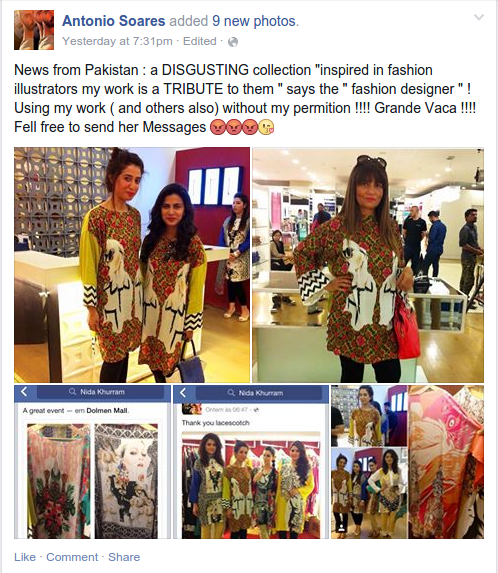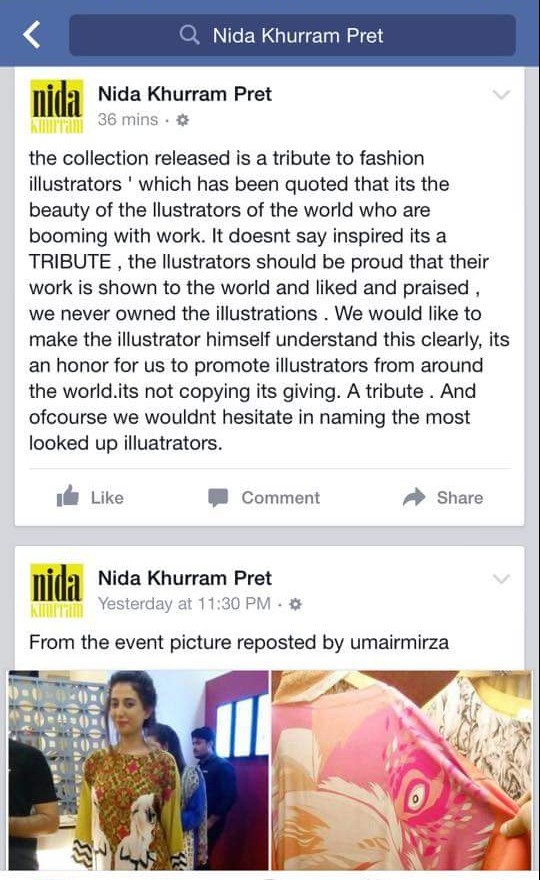KARACHI (Maliha Khan) – In the land of poorly implemented laws, Pakistanis are shamelessly plagiarising left, right and center in the name of ‘inspiration’ and ‘tribute’.
One such guilty designer who recently came under the spotlight is Nida Khurram, who launched her latest “luxury” Swiss lawn collection, only to be publicly humiliated on social media by the original illustrator of the designs (Antonio Soares from Portugal).

In her (pathetically poor) defense, the collection is titled “Tribute to the Fashion Illustrators”.
When one pays a tribute to someone else’s work, common sense dictates basic etiquette be followed, like acquiring the original owner’s permission, actually honouring them, and taking their work forward in ways that make them feel proud, rather than ‘disgusted’.
If in fact you’re making loads of quick, easy bucks off of someone else’s hours of effort and creativity, then the least you could do is not insult yourself (if not your fellow countrymen) further.
By definition, plagiarism is copying someone else’s work and passing it off as one’s own, without any credit or reference whatsoever to the original author/designer/owner. If this is what you need to resort to, to make your business ‘ventures profitable’, as an optimistic Khurram was reported to have commented upon the launch of the now notorious collection, then surely it sheds sufficient light on the scope and extent of your own professionalism and talent (rather, lack thereof).
Now interestingly, there is such a thing called Appropriation in Art, whereby one can use someone else’s work with minimal to zero alteration, and still ‘get away’ with it. The catch, however, is that the new work of art must recontextualise the original work that is being ‘borrowed’. That is, the old piece of work may still be intact in itself but the new piece of art is acceptable in its new form if the entirety of the message and purpose changes. Additionally, the idea or concept in question should not fall under public domain.
Moreover, the two pieces of work should not be in direct and/or close competition with each other. There are several cases where people have apparently earned thousands off others’ work and without serious legal trouble.
In the case of such Pakistani instances, however, quite a few observations make one doubtlessly conclude that something is indeed fishy. First and foremost, the fact that a lot of these illustrations were meant for international clothing and accessories brands, have been copied by a local clothing brand, closes any possible gap on the competition front as far as the definition of appropriation art goes.
Secondly, the context had not sufficiently changed by incorporating illustrations used in/meant for clothing brands such as Chanel. Not even close.
Furthermore, half-wit attempts to save face by saying things like, “It doesnt say inspired its a TRIBUTE, the illustrators should be proud that their work is shown to the world and liked and praised, we never owned the illustrations….”, and then hastening to remove such public comments (the status seen in image below was removed shortly after it was posted), only confirms the desperation to mint money off someone else’s work trying to pass it off as own. It clearly demonstrates a lack of knowledge and understanding of art and fashion, making one wonder whether the major requirement to become a fashion designer here is mere money and name, rather than education, training, and talent.
If indeed one understands and acknowledges that one does not own the illustrations, how could one possibly believe one could get away with selling someone else’s intellectual property without having to face the music? How blatantly unethical can it get to use someone else’s effort for personal commercial gain, with no credit or monetary share going to the owner?
These are signs of a hollow economy, desperate to achieve something or the other in the short run, without any investment in the long term. This huge, looming shadow of shame and shamelessness is a thorough reflection on the system as a whole that has failed on so many fronts, be it the business sector or the law enforcers, that to piece back our tarnished reputation is next to impossible.















